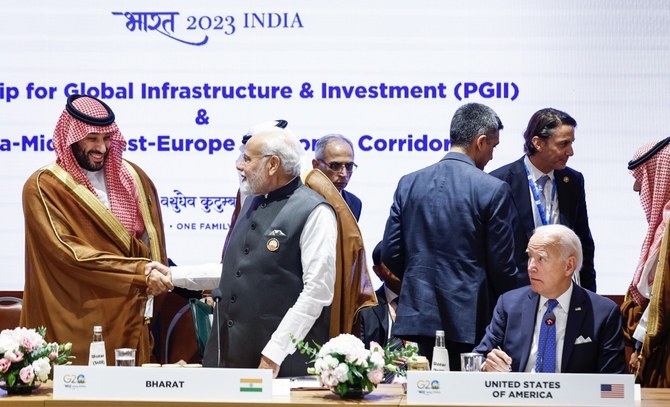Saudi-India Investment Forum builds on business impact of G20 summit

https://arab.news/w6ce4
There may have been criticisms of the G20’s joint declaration at the weekend, including from Ukraine and environmental nongovernmental organizations, but the summit surpassed many expectations and provided some key business takeaways.
This includes the eye-catching new India-Middle East-Europe Economic Corridor initiative, which Saudi Arabia and India are key to. There was also the historic incorporation of the 55 African Union emerging markets into the G20.
Moreover, the business impact continued post-summit, including with Monday’s Saudi Arabia-India investment forum. The Kingdom has emerged as a key partner of India, including in the energy sector, with Riyadh now the third-largest source of crude oil and petroleum products for India.
In October 2019, moreover, the two countries created a Strategic Partnership Council. This body has two pillars: a committee on economy and investments led by the Indian commerce minister and the Saudi energy minister, plus a political, security, social and cultural committee headed by the nations’ foreign ministers.
India is Saudi Arabia’s second-largest trading partner, whereas the Kingdom is India’s fourth-largest. Bilateral trade reached an all-time high of $52.75 billion in 2022-23.
At Monday’s investment forum, the two nations signed a comprehensive energy partnership deal at a time when India — the world’s third-largest oil importer — is looking to become a net exporter of renewable energy.
India has targeted achieving 5 million tons of green hydrogen capacity annually, along with an additional 125 gigawatts of renewable energy capacity by 2030. India is also looking at having 500 GW of renewable energy capacity by the end of the decade.
The India-Saudi Arabia investment forum built on the business impact of the G20 summit at the weekend. Going into that event, there was speculation that it would not be possible to get an end-of-summit agreement. Yet, this proved not only achievable, but also in fast time on the first day of the event, reflecting, in part, the extensive preparations of New Delhi.
Indian chief negotiator Amitabh Kant said that finalizing the draft declaration was the most complex part of the entire G20. He says it took more than 200 hours of negotiations, 300 bilateral meetings and 15 drafts to reach a consensus on paragraphs related to Russia and Ukraine alone.
Inevitably, this meant compromises and, while the Indian event comfortably met the generally low pre-summit expectations, it may not prove as important as some other G20 summits.
At Monday’s investment forum, the two nations signed a comprehensive energy partnership deal at a time when India — the world’s third-largest oil importer — is looking to become a net exporter of renewable energy.
Andrew Hammond
The stand-out one here is the London event in 2009 — at the height of the international financial crisis — that saw the coordination of an approximately $1 trillion stimulus package to bolster the global economy. After that event, then-French President Nicolas Sarkozy made the big claim that “the G20 foreshadows the planetary governance of the 21st century.”
However, the India summit did have a number of potentially key business-related announcements that may yet mark it out. These included the emerging market-rich African Union being granted permanent membership of the G20.
Africa was a key part of the discussions at the event, with the EU and US announcing more details of the new Lobito corridor, which seeks to connect ports in Angola to Zambia and the Democratic Republic of the Congo — home to major deposits of key minerals and metals such as cobalt, lithium and copper.
This builds on a previous G7 agreement to collectively mobilize $600 billion over five years to narrow the “investment gap for sustainable, inclusive, climate-resilient and quality infrastructure in emerging markets and developing countries.”
Perhaps the most eye-catching announcement was that of a different, bigger transport network: the proposed India-Middle East-Europe Economic Corridor. European Commission President Ursula von der Leyen said: “This is nothing less than historic. It will be the most direct connection to date between India, the Arabian Gulf and Europe. It is a green and digital bridge across continents and civilizations.”
The key Asian, Middle Eastern and European nations that have signed up, along with the US, will now develop an action plan. The initiative proposes crossing the Arabian Sea from India to the UAE, then into Saudi Arabia, Jordan and Israel before linking up with Europe.
Another important business takeaway from the event was a pledge by the G20 to “pursue and encourage efforts to triple renewable energy capacity globally.” On the face of it, this is a positive development. However, environmental NGOs have slammed the fact that the G20 declaration contains no deadline for the phasing out of fossil fuels.
In a related area, a new “biofuel alliance” was announced by Brazil, India and the US. Indian Prime Minister Narendra Modi has said he would like all G20 nations to join this club, which aims to intensify efforts to meet net-zero targets by expediting biofuel trade.
On Ukraine, the world leaders agreed to disagree on the war, given the polarized views between Russia and its supporters versus Ukraine’s allies in the West, with the declaration criticized by Kyiv. On the positive side, a pledge was made to resume exports of Ukrainian grain through the Black Sea, but if and when that will happen remains highly uncertain.
In this troubled context, India will welcome the weekend’s overall outcomes. However, the bigger-picture challenge is that the G20 — which was widely seen after the 2009 summit to have seized the mantle from the G7 as the premier forum for international cooperation and global governance — continues to fail to fully realize the scale of the ambition thrust upon it amid growing global geopolitical divisions.
• Andrew Hammond is an Associate at LSE IDEAS at the London School of Economics.









































